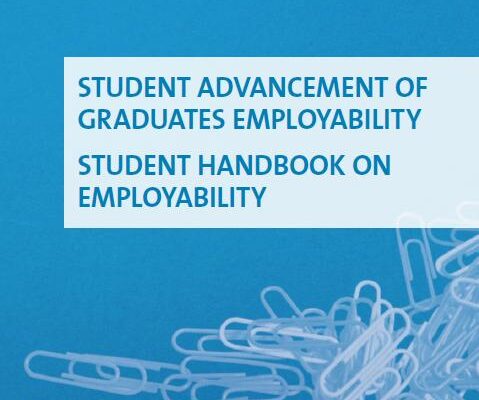
Student Advancement of Graduates Employability: Student Handbook on Employability
This SAGE Handbook is published as part of a pan-European project called Student Advancement of Graduates’ Employability, or SAGE for short. The project aims at increasing knowledge about the effects of higher education reforms in Europe on the employability of graduates. sage also aims at enhancing the capacity of student representatives to take part in discussions and influence policies on employability at the European, national and local level.
An extensive research on educational policies has been carried out and a consultation process organised with multiple stakeholders from both the national and European level as well as training sessions and events for students and other interested stakeholders’ representatives, in order to build this capacity. The SAGE project falls into the footsteps of several projects previously led by esu that have examined various aspects of policies in higher education from the students’ perspectives. Those projects have empowered student representatives to take a more active part in the governance of higher education institutions and the decision-making processes with regards to national and local policies. Other publications issued as part of the SAGE project include Bologna With Students’ Eyes 2012, a review on the Europe 2020 strategy in national policy making and a study on employability. In addition, a wiki-style website, found at www.sage.esu-online.org, has been compiled with data and information collected throughout the project’s life cycle.
The handbook serves as a helping tool for student organisations and other stakeholders within the higher education community that want to enhance the employability of students and graduates. A selection of different discussions, study cases and practises has been compiled in order to share the experience of students and other stakeholders in Europe. This will help anyone involved in discussions on employability to advocate for actions towards enhancing long-term employability that is based on a concept fitting the different purposes of higher education.
The research team has found it necessary to include different discussions on the topic of employability. The reasoning behind this is that it gives an understanding of the various views existing on employability, since the topic is being constantly debated. Student representatives need to understand these opinions and the rationality of the arguments when dealing with employability. When participating in debates this will give full understanding of the standpoint of different parts and it will strengthen the students’ position in the debate. The research team does not wish to take and stand in these discussions, but leave it to the reader to make his own assumption.
Study visits were organised to the countries of the project’s partnering unions (Denmark, Finland, Hungary and Spain). Therefore, a chapter with case studies of the four countries has been included in this handbook. This gives an insight into four unique cases and situations in Europe and demonstrates different approaches taken to tackle the topic of employability. The standpoints and actions of different stakeholders involved are described to reflect the diverse opinions on employability and what the right methods to tackling the issue might be.
The practises and initiatives in the handbook have been chosen in order to give concrete ideas on what is being done across Europe. These practises and initiatives are national, regional or institutional in their scope and executed by students, higher education institutions, companies or other stakeholders, and collected during the research period. They will serve as examples that student unions can advocate in discussions with their respective partners with the aim at enhancing employability.
Finally, the chapter on the different exercises has a practical dimension, since this part of the handbook focuses on how the student unions can do or promote activities regarding the employability of graduates. These exercises are hands-on activities that student unions can use to help students on national or institutional level.
